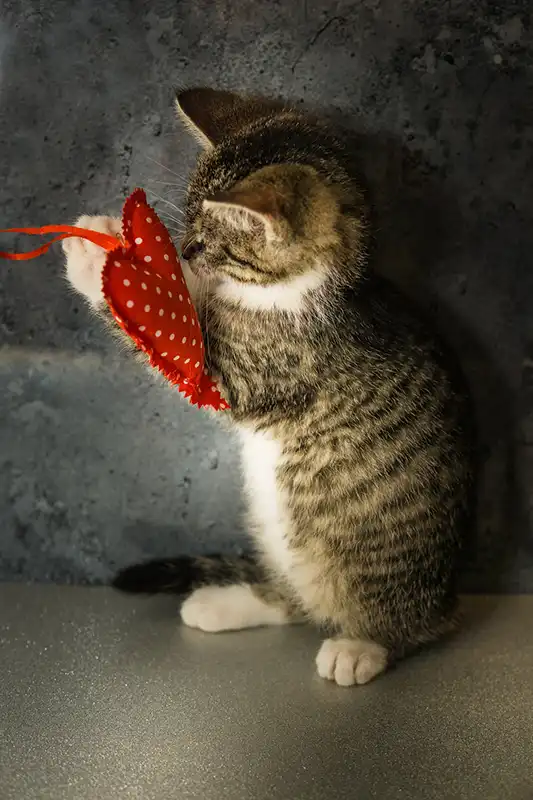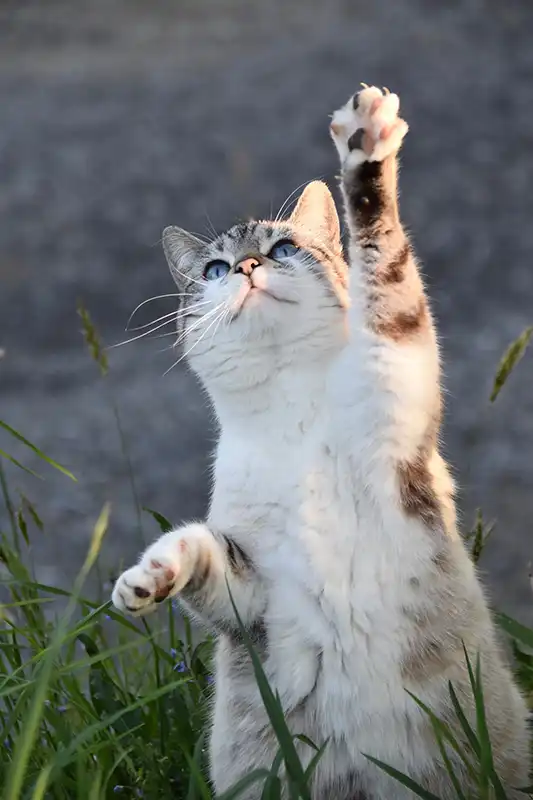Are you considering getting a new feline friend? Many people opt for kittens when they decide to adopt a new cat. We understand the reasoning there. Not only is little Fluffy really, really cute during this charming stage of her life, but there’s a lot to be said for raising your pet yourself. That aside, older kitties also offer some unique charms. A local Northwest Arkansas vet delves into adopting an older cat in this article.
What Are The Benefits Of Adopting An Older Cat?
Older kitties have many of the same adorable traits as their younger counterparts. They’re full of purrsonality, and they each have their own individual characters and vocalizations. One of the best things about older cats is the fact that they tend to be very easy keepers. Fluffy won’t be as frisky or mischievous as a kitten, and will likely spend the majority of her time sleeping. Plus, your furry pal will most likely already have been fixed, so you shouldn’t have to worry about that procedure.
Do Senior Cats Still Play?
While an older cat isn’t going to be quite as active or playful as a kitten, she’ll definitely want to let her inner kitten out now and then. Your pet may tap out after a few pounces, but that’s fine! Even a few minutes of running and jumping is good for her.
How Should I Get My House Ready For An Older Cat?
For the most part, it’s going to be quite a bit like preparing for a younger feline. You’ll still need to address potential hazards, such as small and sharp objects, ropes and cords, and toxic plants. However, you’ll also want to take steps to make your place senior-friendly. Fluffy may appreciate a nightlight to help her get around after dark. We would also suggest getting a litterbox with shallow sides. Many older cats find these easier to get in and out of than regular litterboxes.
Aside from that, just make sure your furry pal has lots of comfy napping spots. These should be easy for her to reach. Older kitties do very much appreciate having some pieces of cat furniture. choose things that are easy for your pet to get on and off.
Do Older Cats Bond With New Owners?
Definitely! In fact, many people find senior cats extremely affectionate and cuddly. This makes sense. If Fluffy has been in a shelter for a long time, and/or was saved from living as a stray, she may very well be incredibly grateful to her new owners. Cats know when someone has been kind to them, and they tend to be extremely devoted to those who have helped them.
That said, keep in mind that cats all have their own personalities. Some are friendly and outgoing, while others are more timid. Don’t be discouraged if it takes Fluffy time to warm up and feel safe. That will only make it even more special when she finally does decide to snuggle with you.
Do Senior Cats Make Good Pets?
Kitties in their golden years can make absolutely wonderful pets. For one thing, they’ve pretty much outgrown the zoomie kitten stage, and are well past those adorable but exhausting terrible twos. Most are content to spend their days napping, sunbathing, and, of course, grooming themselves. That makes them very easy keepers.
Another great thing about older cats? Most have been pets before, and know what is and is not allowed.
Is It Hard To Take Care Of A Senior Cat?
Older cats are usually pretty easy keepers. As mentioned above, Fluffy will spend the majority of her time sleeping. That doesn’t mean she’s completely self-sufficient. You’ll of course need to provide good, age-appropriate food, a clean litterbox, fresh water, and regular veterinary care.
We would also recommend that you brush your feline pal regularly. As cats age, they tend to get a bit stiff and sore. This can make it hard for them to groom themselves properly. Give your little buddy a hand by regularly brushing her to remove dead fur and dander from her coat. This will not only keep her looking great and feeling comfy, it will also reduce hairballs.
Aside from that, we strongly advise keeping your pet inside. The Great Outdoors is dangerous for all cats, but it’s particularly perilous for older kitties. They may not be strong or agile enough to escape potential dangers. Plus, a senior furball would be very much at risk of getting lost.
Of course, we would always suggest asking your vet for specific advice as far as your pet’s care needs. That includes information on things like grooming, playtime, and, of course, diet.
What Should I Know Before Adopting A Senior Cat?
When it comes to adopting animals, we advocate for both following one’s heart and doing lots of research. Before adopting any pet, you’ll need to consider certain things, such as your budget, household, time commitment, and other pets.
That said, here are a few things to keep in mind.
The average housecat lives between 12 to 18 years. However, with advances in veterinary medicine and a better general understanding of kitty care, it’s no longer unusual for kitties to make it to 19 or even their early 20s.
Indoor cats will have longer lifespans, in general, than outdoor cats, because they aren’t exposed to the risks kitties face outside.
Our feline pals are considered seniors by 11. That number varies: some places or organizations may consider Fluffy a senior at just 10. A ten-year-old cat may have several years ahead of her, while a 15-year-old would be considered geriatric, and may not have that much time left.
That’s not to say that you shouldn’t adopt a geriatric kitty. In fact, many people find that giving sweet pets a great home to live out their sunset years is very fulfilling. The main thing is to make sure that you can commit to caring for Fluffy for the rest of her life.
What Health Problems Are Senior Cats Susceptible To?
Just like people, cats become more vulnerable to illness and injury as they grow older. Fluffy will likely need to go to biannual appointments instead of yearly visits. Keeping up with regular screenings is crucial, as this can reveal problems that are just developing. Some of the things that we often see in older cats include hyperthyroidism, kidney disease, dental issues, arthritis, cancer, diabetes, heart disease, and urinary tract infections. Fluffy may also experience cognitive decline and/or a loss of her vision or hearing.
Keep a close eye out for signs of sickness. These include the following:
- Weight loss
- Increased vocalization
- Changes in appearance
- Lack Of Appetite
- Bad breath
- Changes in grooming
- Vomiting
- Excessive thirst
- Different sleep patterns
- Lethargy
- Unkempt coat
- Withdrawal
- Respiratory Distress
- Fever
- Litterbox Issues
- Skin problems
Contact your Northwest Arkansas vet right away if you notice any of these. The sooner an issue is caught and treated, the better!
What Makes Senior Cats Happy?
Older kitties enjoy the same things as young ones, for the most part. Fluffy’s favorite things include warm beds, boxes, sunbeams, toys, catnip, and most of all, love. In fact, we think there’s something really precious about senior cat purrs!
Make An Appointment at Our Northwest Arkansas Pet Hospital
Do you have questions about senior cat care? Contact us, your local Northwest Arkansas pet hospital, today. We are dedicated to offering top-notch veterinary services!







!Social Media Icons